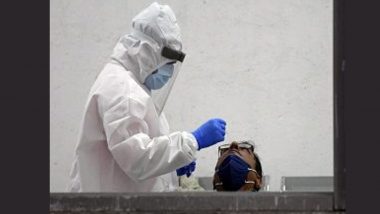London, Oct 29: Researchers have identified a potential new drug treatment that suppresses the reproduction of SARS-CoV-2 virus, that causes COVID-19, in infected cells.
To multiply, all viruses infect cells and reprogramme them to produce novel viruses, the researchers said.
Also Read | 1.5 Million Children in Central Africa Need Emergency Aid: UN.
The study, published recently in the journal Metabolites, shows that cells infected with SARS-CoV-2 can only produce novel coronaviruses when a metabolic pathway called pentose phosphate pathway is activated. COVID-19 Treatment Update: Researchers Identify Potential New Way of Treating Coronavirus.
The researchers from the University of Kent in the UK and Goethe-University in Germany found that the drug benfooxythiamine, an inhibitor of this metabolic pathway, suppressed reproduction of SARS-CoV-2, and infected cells did not produce coronaviruses.
Also Read | 1.5 Million Penguins ‘Supercolony’ Earlier Detected From Space, Discovered on Antarctica’s Danger Islands.
"This is a breakthrough in the research of COVID-19 treatment," said Professor Martin Michaelis from the University of Kent.
"Since resistance development is a big problem in the treatment of viral diseases, having therapies that use different targets is very important and provides further hope for developing the most effective treatments for COVID-19," Michaelis said.
The researchers found that benfooxythiamine also increased the antiviral activity of '2-deoxy-D-glucose', another drug which modifies the host cell's metabolism to reduce virus multiplication.
This shows that pentose phosphate pathway inhibitors like benfooxythiamine are a potential new treatment option for COVID-19, both on their own and in combination with other treatments, they said.
The researchers noted that the drug's antiviral mechanism differs from that of other potential COVID-19 drugs such as remdesivir and molnupiravir.
They noted that viruses resistant to these drugs may, therefore, be sensitive to benfooxythiamin.
"Targeting virus-induced changes in the host cell metabolism is an attractive way to interfere specifically with the virus replication process," Professor Jindrich Cinatl from Goethe-University added.
(This is an unedited and auto-generated story from Syndicated News feed, LatestLY Staff may not have modified or edited the content body)













 Quickly
Quickly





















